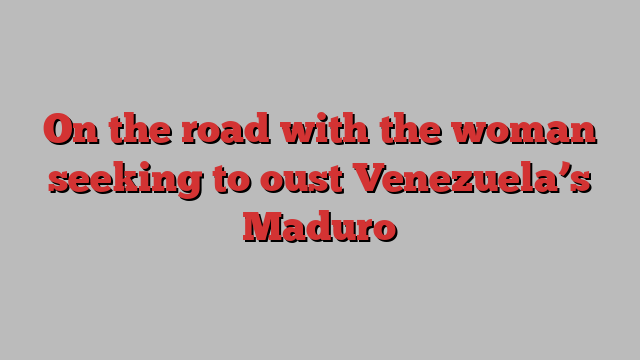
Venezuela’s opposition leader María Corina Machado has faced numerous obstacles in her campaign to unseat long-ruling authoritarian president Nicolás Maduro. The latest ones were long, verdant and freshly cut.
A small group of indigenous protesters had hacked branches off roadside trees and heaped them across the main highway leading to the city of Maracaibo, shortly before Machado’s motorcade was due to pass on the way to an opposition rally on Tuesday evening. After tense negotiations, her supporters persuaded the protesters to give way.
“We’re going into an election with the playing field tilted like this,” Machado told the Financial Times later that night, sloping her hand at a 45-degree angle as she listed other obstacles she and her campaign team had navigated — many of them explicitly linked with the government — ahead of Sunday’s election, in which Maduro hopes to secure another six-year term.
“There was no sound system and no stage [for the rally] because they arrested the six people who were going to supply it. Nobody in the city would rent us another one, even at three times the going rate, because they were all scared,” she said.
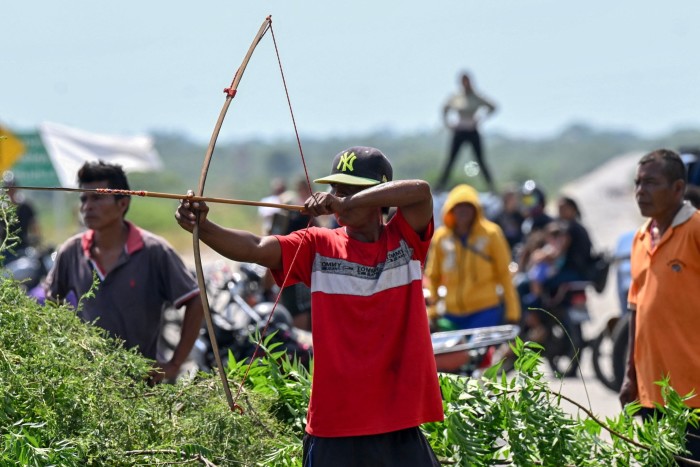
The daughter of a wealthy steel magnate. Machado, 56, speaks fluent English and grew up among Venezuela’s elite, but has remade herself during the campaign. She has dressed down and adopted a plain-speaking, down-to-earth style that has electrified an opposition long despondent about its chances of victory.
Forced to travel long distances by car because no airline will sell her a ticket, Machado’s trip on Tuesday to Venezuela’s second-biggest city was a typically challenging one. It began in the dead of night shortly after 4am from a pre-arranged rendezvous in a quiet Caracas cul-de-sac.
The 12-car convoy of SUVs included a truck carrying jerry cans of petrol for refuelling en route, as fuel can be scarce and the government frequently shuts down petrol stations along highways where she is scheduled to travel.
Within minutes, two unmarked cars had joined the convoy, dodging in between the vehicles — a typical pattern used by the state intelligence agency. Police at checkpoints along the highway filmed the vehicles as they passed but did not attempt to halt them.
The only stop en route was after five hours at a supporter’s house in the city of Barquisimeto, a strategy adopted to avoid exposing ordinary citizens to retaliation — because restaurants that previously served Machado have been subsequently closed by police.
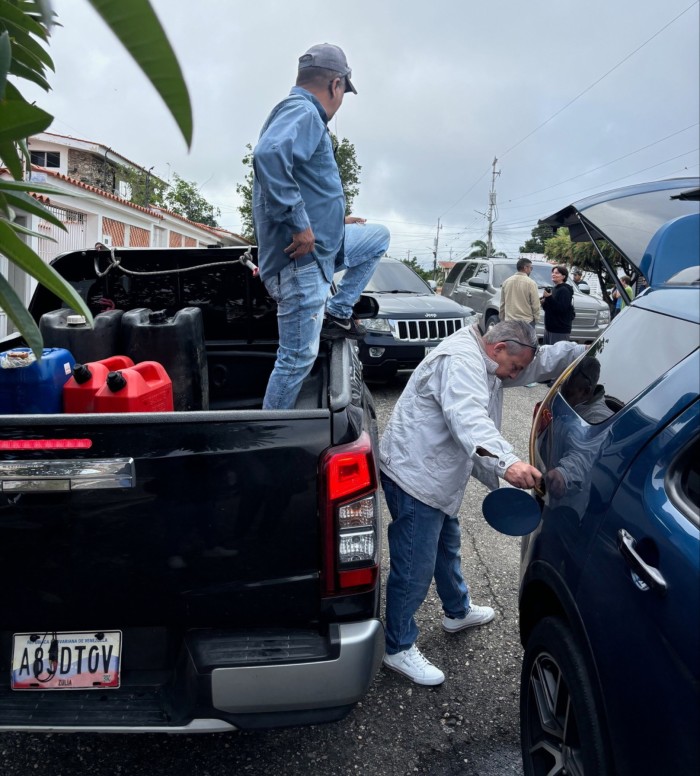
Ironically, Machado is not even on Sunday’s ballot after the government banned her from running. That forced her to select Edmundo González, a mild-mannered 74-year-old retired career diplomat, as a surrogate.
Machado, however, remains confident that the insurgent opposition campaign — largely waged on social media — can triumph over chavismo, the socialist political movement named after Maduro’s predecessor Hugo Chávez, which has governed Venezuela for the past quarter-century and shows no sign of wanting to stop now.
Posters of a smiling Maduro line the main streets of Caracas, with no other candidate visible. “We don’t have a single poster in the street and all the media have been giving space to regime propaganda, whether willingly or not . . . but we’ve won the people’s support without a single radio or TV spot,” Machado said.
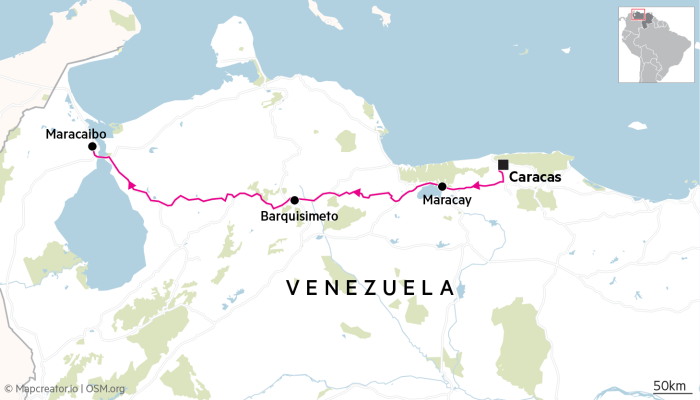
As the convoy drew nearer to Maracaibo, cheering crowds lined the streets in towns along the route, swarming around Machado’s SUV to demand selfies and autographs. Posses of local motorcyclists formed spontaneously to escort her on her way.
Later that evening, after a chaotic joint news conference, Machado and González took to the streets of Maracaibo in an open-topped truck. Tens of thousands of people chanted “Freedom, freedom! The government is going to fall!” and sounded a deafening cacophony of vuvuzelas, car horns and revved motorbike engines as the opposition duo inched past, waving.
Political analysts say the opposition is capitalising on a strong desire for change in a population weary of economic crisis, government corruption and repression. González has not published a detailed manifesto but wants to form a national unity government to negotiate a peaceful transition, and promises to draw on Machado’s ideas of free enterprise, widespread privatisation and respect for individual rights.
Is Maduro particularly scared of women, Machado was asked after the rally. “I don’t know, but he ought to be,” the opposition leader replied. “They underestimated me . . . they thought: ‘She’s a liberal, her family has money, she’s a woman, she won’t get anywhere.’ But we Venezuelan women are fierce.”
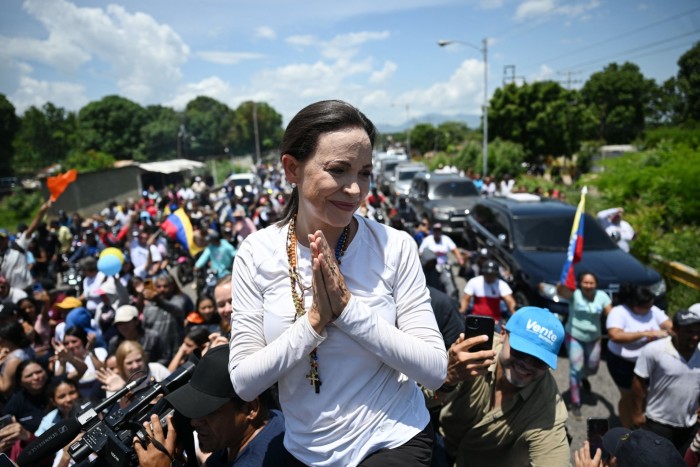
With four days until the vote, the big question remains whether Maduro will accept what opinion polls predict will be a heavy defeat. He has vowed to win the election “by hook or by crook” and predicted a “bloodbath” if he does not. Anointed by a dying Chávez as his successor in 2013, the former bus driver has outfoxed the opposition many times before.
Regardless of how the votes are cast, Maduro controls the army, the police, the courts, the election authority and a party machine that makes liberal use of government money to hand out jobs and food parcels to supporters and to punish the disloyal.
Government officials insist they are confident of a big victory. But the opposition is betting that this time, with a weak economy and widespread poverty eating into his popularity, Maduro has miscalculated by allowing an election to go ahead that he had expected to win easily.
“The referee is on their side, our striker has his hands tied behind his back, but the whole stadium wants us to win,” Machado said of the contest.
Many believe the government could resort to rigging the count if its votes fall short on Sunday. “Maduro has a red nuclear button which he can press if he needs to,” said one well-connected Venezuelan political expert. Rumours circulating on the street predict everything from power cuts to internet outages as results are tallied.
The opposition hopes to station thousands of witnesses at polling stations to monitor the election and conduct its own parallel vote count, but supporters have complained of difficulties in registering with the government-controlled election authority to gain access to polling stations.
If both sides claim victory on Monday morning, the position taken by the international community could be crucial. The US has no embassy in Venezuela after being expelled in 2019, but regional power Brazil may play a mediating role. President Luiz Inácio Lula da Silva has dispatched his top foreign policy adviser Celso Amorim to Caracas for the election.
With investors keen to see the west normalise relations with Venezuela to unlock a restructuring of about $160bn of debt and boost oil production, and the Biden administration desperate to stem the flow of Venezuelan refugees, some opposition figures are concerned that the US and EU are under pressure to accept a flawed Maduro victory.
“I hope nobody in the international community thinks they can negotiate with their back turned to the votes cast,” Machado told the FT. “Since when are elections defined not by votes but by deals done by the international community?”